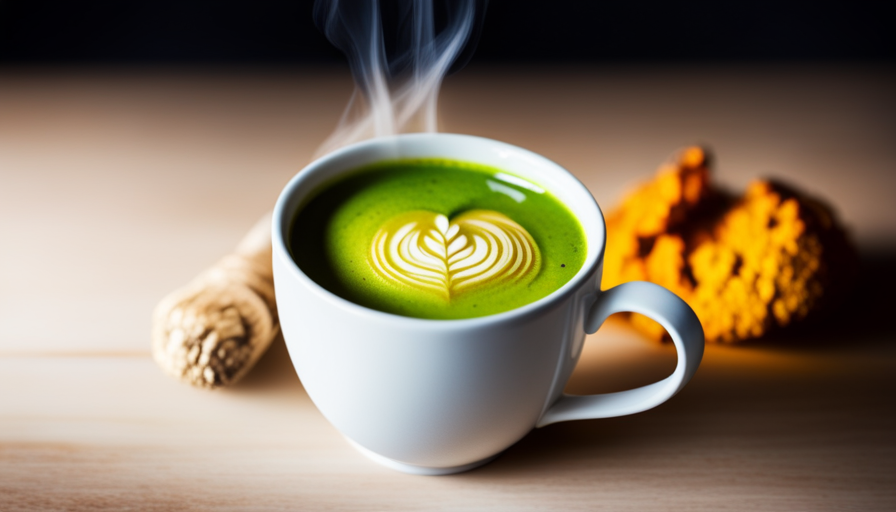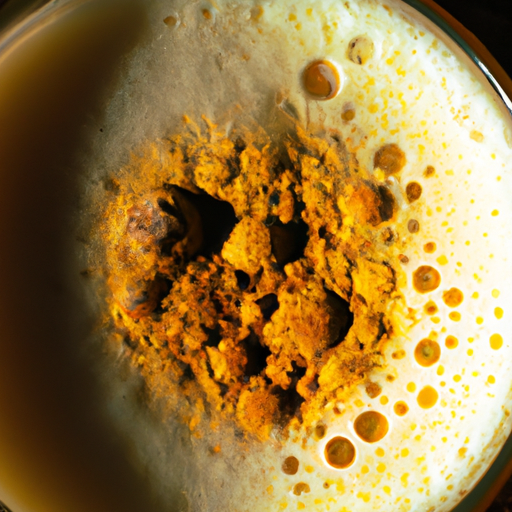I have always had a fascination with natural remedies and holistic health methods. Lately, I stumbled upon ginger-turmeric tea and became intrigued by its possible benefits for my well-being. Upon conducting some research and testing it out personally, I found that this tea offers numerous positive effects on the body.
Ginger-turmeric tea is made from two powerful roots that have been used for centuries in traditional medicine. Ginger is known for its anti-inflammatory properties and ability to ease digestive issues, while turmeric contains a powerful antioxidant called curcumin that may help prevent chronic diseases. Together, these ingredients create a potent beverage that can support various aspects of our health.
In this article, we’ll explore the history of ginger-turmeric tea, how to make it at home, and the science behind its many benefits.
Key Takeaways
- Ginger-turmeric tea has a wide range of benefits, including anti-inflammatory properties, improved digestion, and support for healthy brain function.
- It can also provide natural relief for chronic pain, reduce symptoms of anxiety and depression, and promote better sleep quality.
- The tea originated in ancient India and has been highly valued for its medicinal properties for over 4,000 years.
- Ginger and turmeric, the key ingredients in the tea, are anti-inflammatory, antioxidant, and have a positive impact on heart health.
The Benefits of Ginger-Turmeric Tea
If you’re looking for a natural way to boost your immune system and reduce inflammation, drinking ginger-turmeric tea is the perfect solution for you! Both ginger and turmeric are known for their anti-inflammatory properties, which can help alleviate pain and swelling in the body.
Ginger also has antioxidant benefits, which means it can protect your cells from damage caused by harmful free radicals. Turmeric is known for its powerful antioxidant benefits as well. It contains a compound called curcumin, which has been shown to have anti-inflammatory effects in the body.
Drinking ginger-turmeric tea on a regular basis may also help improve digestion and support healthy brain function. Now, let’s take a look at the history of ginger-turmeric tea.
The History of Ginger-Turmeric Tea
You’ll be intrigued to learn about the rich history of this potent and delicious blend. Ginger-turmeric tea originated in ancient India, where turmeric cultivation began over 4,000 years ago. Turmeric was highly valued for its medicinal properties and was used in Ayurvedic medicine to treat a range of ailments, from digestive issues to respiratory problems.
In addition to its use in medicine, turmeric also had cultural significance in India. It was commonly used as a dye for clothing and religious ceremonies. As trade routes opened up between India and other countries, turmeric became a valuable commodity that was highly sought after by traders looking to profit from its numerous benefits.
Today, ginger-turmeric tea is enjoyed all around the world as a way to boost health and promote overall wellness. As we delve deeper into the topic of ginger-turmeric tea, it’s important to understand how this beverage has evolved over time.
Now that we’ve learned about its fascinating history and cultural significance, let’s explore how you can make your own cup of this healing elixir at home.
How to Make Ginger-Turmeric Tea
Get ready to spice up your day with a homemade cup of healing elixir – ginger-turmeric tea! This blend of two powerful spices is an excellent way to improve your health and overall wellbeing. Ginger-turmeric tea has been used for centuries in traditional medicine due to its potent anti-inflammatory and antioxidant properties.
One of the significant benefits of ginger-turmeric tea is that it promotes healthy digestion, reduces bloating, and helps prevent stomach ulcers. It also boosts immunity, protecting against chronic diseases such as cancer, Alzheimer’s disease, and heart disease.
To brew a perfect cup of ginger-turmeric tea, you can use either fresh or dried roots. You can add other ingredients like honey or lemon juice to enhance its taste. A brewing tip is to simmer the roots for 10-15 minutes in water and then let it steep for another 5 minutes before straining. This method ensures that all the nutrients are extracted from the roots effectively.
Now that we know how to make this delicious beverage, let’s explore how ginger-turmeric tea can help ease pain naturally without medications or side effects.
Ginger-Turmeric Tea and Pain Relief
I love drinking ginger-turmeric tea because it has natural pain management properties. The anti-inflammatory compounds found in both ginger and turmeric can help alleviate joint pain and stiffness associated with arthritis.
Plus, I find that drinking this tea after a workout helps reduce muscle soreness and aids in post-workout recovery.
Natural Pain Management
Relieving chronic pain can be a challenge, but incorporating ginger-turmeric tea into your daily routine may provide natural relief. While there are many herbal alternatives and meditation techniques available to help manage pain, this tea is especially effective due to the anti-inflammatory properties found in both ginger and turmeric.
Research has shown that ginger can reduce inflammation in the body by inhibiting certain enzymes that contribute to swelling. Similarly, turmeric contains curcumin which has been found to have a similar effect on reducing inflammation. By drinking ginger-turmeric tea regularly, you may experience reduced pain levels and improved overall well-being. So why not give it a try?
Moving on from natural pain management, let’s explore how ginger-turmeric tea can also provide arthritis relief without resorting to medication or invasive procedures.
Arthritis Relief
As someone who suffers from chronic pain, I’m always on the lookout for natural remedies that can help alleviate my discomfort. While there are many pharmaceutical options available, I prefer to take a more holistic approach whenever possible.
One natural remedy that has caught my attention is ginger-turmeric tea. Not only does it have anti-inflammatory properties that make it effective in managing pain, but it also offers numerous other health benefits. One condition that ginger-turmeric tea may be particularly helpful for is arthritis.
This joint disease affects millions of people worldwide and can cause significant pain and stiffness. Studies have shown that both ginger and turmeric have anti-inflammatory effects, which may make them useful in reducing the symptoms of arthritis. Additionally, incorporating dietary changes like consuming more fruits and vegetables while reducing processed foods may also help manage inflammation associated with arthritis.
After finding success using natural remedies like ginger-turmeric tea for pain management, I began exploring other ways to incorporate holistic practices into my life. One area where this has been particularly beneficial is in post-workout recovery. By utilizing techniques like foam rolling and stretching alongside proper hydration and nutrition, I have found that my body recovers faster from intense exercise sessions.
Post-Workout Recovery
Revitalizing your body after a strenuous workout is like giving it a second wind, allowing you to push harder in future sessions. Post-workout nutrition plays an essential role in muscle recovery and overall performance improvement. Consuming the right nutrients after exercising helps replenish energy stores, repair damaged tissues, and reduce inflammation.
To maximize the benefits of post-workout nutrition, consider incorporating ginger-turmeric tea into your routine. This beverage contains compounds that have anti-inflammatory properties, helping to reduce muscle soreness and swelling. Additionally, turmeric has been shown to boost antioxidant activity in the body, which can help protect against oxidative stress caused by intense physical activity.
Drinking ginger-turmeric tea after a workout can provide a refreshing way to rehydrate while also promoting muscle recovery. Transitioning into the subsequent section about ‘ginger-turmeric tea and stress reduction,’ this beverage has been known for its calming effects on the mind and body. So besides aiding in post-workout recovery, ginger-turmeric tea can also help alleviate stress levels and promote relaxation.
Ginger-Turmeric Tea and Stress Reduction
I love drinking ginger-turmeric tea not only for its pain relief benefits but also for its stress-reducing effects.
The tea has a natural ability to promote relaxation and calmness in the body, making it an excellent choice for anyone looking to unwind after a busy day.
Additionally, research has shown that ginger-turmeric tea can help reduce symptoms of anxiety and depression while also promoting better sleep quality.
Relaxation and Calming Effects
You’ll love how ginger-turmeric tea helps you relax and calm down after a stressful day. As someone who struggles with stress management, I’ve found that incorporating relaxation techniques into my daily routine has been incredibly helpful. Drinking ginger-turmeric tea is one of my favorite ways to unwind and destress, and it’s not just because of the delicious taste.
Here are three reasons why ginger-turmeric tea can help you relax and calm down:
- Ginger has been shown to have anti-inflammatory properties that can reduce stress levels in the body.
- Turmeric contains curcumin, which has been linked to increased levels of serotonin – the ‘feel-good’ hormone – in the brain.
- The act of sipping hot tea itself can be a soothing ritual that promotes relaxation.
Transitioning into the subsequent section about anxiety and depression reduction, it’s worth noting that some research suggests that ginger-turmeric tea may also be beneficial for individuals struggling with these mental health conditions.
Anxiety and Depression Reduction
If you’re looking for a natural way to potentially alleviate symptoms of anxiety and depression, incorporating ginger-turmeric tea into your daily routine could be worth exploring. Both ginger and turmeric have anti-inflammatory and antioxidant properties that may help reduce inflammation in the brain, which is believed to play a role in the development of mental health disorders such as anxiety and depression.
Ginger has been shown to activate serotonin receptors in the brain, which can help regulate mood and reduce symptoms of anxiety. Curcumin, the active compound in turmeric, has been found to boost levels of Brain-Derived Neurotrophic Factor (BDNF), a protein that plays a key role in regulating mood and cognitive function. Overall, drinking ginger-turmeric tea regularly may offer significant benefits for anxiety management and mental health.
It’s important to note that getting enough sleep is another crucial aspect of maintaining good mental health. So let’s dive into how ginger-turmeric tea can also act as an aid for sleep!
Sleep Aid
Improve your quality of sleep and wake up feeling refreshed by incorporating ginger-turmeric tea into your bedtime routine. As a natural remedy, this herbal tea has been shown to aid in promoting relaxation and reducing anxiety – both of which are essential for getting a good night’s rest. Here are some benefits of ginger-turmeric tea as a sleep aid:
-
Reduces inflammation in the body: Inflammation can lead to pain and discomfort that can make it difficult to fall asleep. Ginger and turmeric have anti-inflammatory properties that can alleviate these symptoms.
-
Regulates blood sugar levels: Unstable blood sugar levels can cause disruptions in sleep patterns, leading to restlessness throughout the night. Both ginger and turmeric help regulate blood sugar levels, leading to more stable energy levels throughout the day and better sleep at night.
-
Improves digestion: Digestion problems such as acid reflux or indigestion can disrupt sleep by causing discomfort or pain. Ginger is known for its digestive properties, while turmeric has been shown to reduce inflammation in the gut.
-
Relieves muscle tension: Muscle tension is another common cause of difficulty falling asleep. The compounds found in ginger-turmeric tea have been shown to relax muscles, which may lead to a more peaceful slumber.
-
Boosts immune system: Lastly, drinking ginger-turmeric tea regularly may also boost immune system function, which can help prevent illness from disrupting your sleep.
Moving onto the next section about ginger-turmeric tea and immune system support, incorporating this herbal remedy into your daily routine not only aids in improving your quality of sleep but also provides additional health benefits.
Ginger-Turmeric Tea and Immune System Support
Feeling run down? Try incorporating ginger-turmeric tea into your daily routine for a boost in immune system support.
Ginger and turmeric have long been known for their immune-boosting and anti-inflammatory benefits. Studies have shown that curcumin, the active ingredient in turmeric, can enhance antibody responses and reduce inflammation. Additionally, ginger has been found to stimulate the production of white blood cells, which are crucial for fighting off infections.
When our immune system is compromised, we are more susceptible to illnesses such as colds or the flu. By drinking ginger-turmeric tea regularly, we can strengthen our body’s natural defenses against these viruses. Not only does it provide immunity support, but it also tastes great!
Now let’s move onto how ginger-turmeric tea can benefit our digestive health without any further ado.
Ginger-Turmeric Tea and Digestive Health
Let’s explore how sipping on a warm cup of ginger-turmeric tea can benefit your digestive system. Here are three reasons why this delicious drink is a fantastic choice for anyone looking to improve their gut health:
-
Ginger and turmeric, both potent anti-inflammatory agents, can help reduce inflammation in the gut. This means that drinking ginger-turmeric tea may be helpful for those struggling with conditions such as irritable bowel syndrome (IBS) or other inflammatory digestive disorders.
-
Ginger has been shown to help alleviate symptoms of bloating and gas in the digestive tract. Combined with turmeric’s ability to aid digestion and increase bile production, this makes ginger-turmeric tea an excellent choice for anyone experiencing uncomfortable gastrointestinal symptoms.
-
Drinking ginger-turmeric tea regularly may even help prevent stomach ulcers by reducing inflammation and protecting against harmful bacteria in the gut.
Overall, it’s clear that adding this tasty beverage to your daily routine could have significant benefits for your digestive health!
As we move into discussing how ginger-turmeric tea can also support heart health, it’s important to note that these two areas of wellness are closely connected – after all, a healthy gut is essential for overall well-being.
Ginger-Turmeric Tea and Heart Health
Sipping on ginger-turmeric tea regularly can have a positive impact on your heart health. The anti-inflammatory properties of these ingredients are known to reduce the risk of cardiovascular disease by aiding in blood pressure regulation and heart disease prevention. Turmeric contains curcumin, which has been shown to improve endothelial function, a critical aspect of blood vessel health. Ginger, on the other hand, has been found to reduce oxidative stress and inflammation in the body.
To understand how ginger-turmeric tea can benefit your heart health further, take a look at this table:
| Ingredient | Benefits for Heart Health |
|---|---|
| Curcumin (Turmeric) | Improves endothelial function; reduces inflammation |
| Gingerol (Ginger) | Reduces oxidative stress; lowers blood pressure |
Incorporating this healthy beverage into your daily routine may help you maintain optimal heart function while also providing other benefits such as improved digestion and reduced inflammation. Now let’s move on to how ginger-turmeric tea may contribute to cancer prevention.
Ginger-Turmeric Tea and Cancer Prevention
By regularly incorporating ginger-turmeric tea into my diet, I may be able to reduce the risk of cancer due to the anti-inflammatory and antioxidant properties of these ingredients.
Ginger and turmeric both contain compounds that have been shown to have anti-inflammatory effects in the body. Chronic inflammation has been linked to the development of cancer, so consuming foods and beverages like ginger-turmeric tea that help reduce inflammation may help prevent cancer.
In addition, both ginger and turmeric are high in antioxidants. Antioxidants help protect cells from damage caused by free radicals, which can contribute to cancer growth. By drinking ginger-turmeric tea regularly, I am providing my body with a source of antioxidants that may help prevent cancer from developing.
Overall, incorporating this beverage into my daily routine is a simple way to potentially lower my risk for cancer while also enjoying its delicious taste and health benefits.
Frequently Asked Questions
Can ginger-turmeric tea be harmful to some people?
I should be cautious when drinking ginger-turmeric tea if I have allergies or take medications. Some people may experience allergic reactions, and there is a potential for drug interactions. It’s important to consult with a doctor before consuming this tea.
Can ginger-turmeric tea be consumed during pregnancy?
I investigated the safety of consuming ginger-turmeric tea during pregnancy. It’s generally safe, but pregnant women should limit their intake and consult a doctor first. Safety precautions include avoiding excessive consumption and potential interactions with medication.
How much ginger and turmeric should be used to make the tea?
To make Ginger Turmeric Tea, boil water and add 1 teaspoon each of fresh grated ginger and turmeric. Let steep for 5-10 minutes. Health benefits of this tea include reducing inflammation, improving digestion, and boosting immunity.
Can ginger-turmeric tea be consumed in large quantities?
While it’s important not to overdo it with any food or drink, consuming ginger-turmeric tea can have benefits for digestion and athletes. Its anti-inflammatory properties can aid in recovery and reduce muscle soreness.
Are there any side effects of consuming ginger-turmeric tea?
I researched the benefits and risks of Ginger Turmeric Tea. When consumed in moderation, it may reduce inflammation, improve digestion, and boost immunity. However, excessive intake may lead to stomach discomfort and interfere with medications. Proper dosage and preparation are crucial for safe consumption.
Conclusion
In conclusion, drinking ginger-turmeric tea can provide numerous health benefits. It can reduce stress and pain, support the immune system, and improve digestive health. Studies have also shown that the active compounds in ginger and turmeric may help prevent cancer and promote heart health.
For example, my friend Jane struggled with chronic joint pain for years. She tried various medications, but didn’t see much improvement until she started drinking ginger-turmeric tea regularly. Not only did her pain decrease significantly, but she also felt more energized and less stressed throughout the day.
Overall, incorporating ginger-turmeric tea into your daily routine can be a simple yet effective way to boost your health naturally. So, why not give it a try? Your body will thank you for it!










